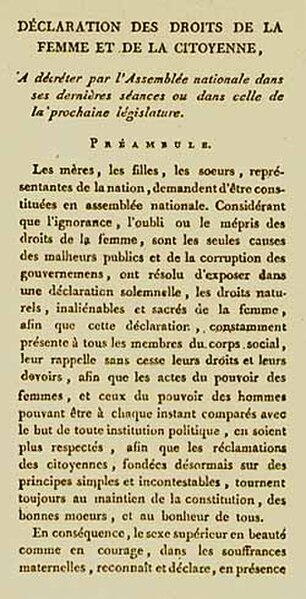Olympe de Gouges was a French playwright and political activist. She is best known for her Declaration of the Rights of Woman and of the Female Citizen and other writings on women's rights and abolitionism.
Jean-Jacques Lefranc, Marquis de Pompignan, widely rumoured to be Olympe de Gouges' father
Olympe de Gouges' son, Pierre Aubry
The Code Noir, a decree passed by King Louis XIV in 1685. The Code Noir defined the conditions of slavery in the French colonial empire and restricted the activities of free Negroes
Olympe de Gouges, 1793
Declaration of the Rights of Woman and of the Female Citizen
The Declaration of the Rights of Woman and of the Female Citizen, also known as the Declaration of the Rights of Woman, was written on 14 September 1791 by French activist, feminist, and playwright Olympe de Gouges in response to the 1789 Declaration of the Rights of Man and of the Citizen. By publishing this document on 15 September, de Gouges hoped to expose the failures of the French Revolution in the recognition of gender equality. As a result of her writings, de Gouges was accused, tried and convicted of treason, resulting in her immediate execution, along with the Girondists.
First page of Declaration of the Rights of Woman and of the Female Citizen
The Debutante (1807) by Henry Fuseli; "Woman, the victim of male social conventions, is tied to the wall, made to sew and guarded by governesses. The picture reflects Mary Wollstonecraft's views in The Rights of Women [sic]".






